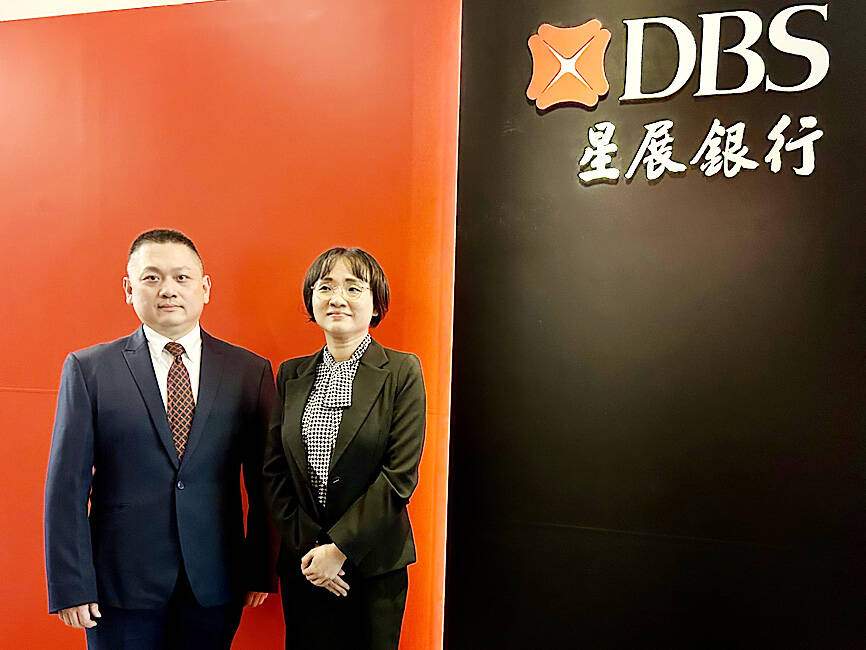Singapore-based DBS Bank yesterday raised its forecast for Taiwan’s GDP growth this year to 4.2 percent, from the 3.5 percent it predicted in April, as the nation’s exports are expected to improve, aided by demand for artificial intelligence (AI) applications.
DBS senior economist Ma Teiying (馬鐵英) told a news conference in Taipei that she was aware the projection is higher than most forecasts, including the Directorate-General of Budget, Accounting and Statistics’ 3.94 percent.
Ma attributed her optimism to a robust recovery and the arrival of the high sales season for technology products.

Photo: AFP
Growth momentum would pick up quarterly, but slow year-on-year due to a base comparison effect, she said.
Generative AI is fueling demand for high-performance AI chips in data centers, as US technology titans Amazon Web Services, Alphabet Inc’s Google, Microsoft Corp and others spend lavishly on developing AI-optimized chips to enhance operational efficiency and reduce costs in delivering AI-based services, Ma said.
AI integration in PCs and smartphones would also present new opportunities for commonly used applications, she said, adding that AI-capable laptops would make up 13 percent of the market this year and soar to 74 percent by 2027.

Photo: Wu Hsin-tien, Taipei Times
At the same time, AI-enabled smartphones would comprise 11 percent of shipments this year and spike to 43 percent in the next three years, she said.
World Semiconductor Trade Statistics recently revised its forecast for global semiconductor market growth to 16 percent year-on-year, up from its previous estimate of annual growth of 13.1 percent, citing robust advancements in memory and logic chip segments, Ma said, adding that the pace of expansion would reach 12.5 percent next year.
Gartner Inc has also projected that global revenue from AI chips would swell 33 percent year-on-year this year to US$71 billion, she said.
However, recovery in non-tech manufacturing sectors would continue to lag, as China’s soft private consumption and property market have dampened demand for imports of consumer goods, Ma said.
In addition, cross-strait tensions have slowed Taiwan’s exports of petrochemicals, textiles, metals, machinery and transportation equipment, she said.
China remains Taiwan’s largest export destination with a 30 percent share, despite efforts to diversify export markets.
DBS stood by its 2.2 percent inflation estimate for Taiwan this year and described the central bank’s monetary policy as moderate, although carrying a tightening bias.
The bullish property market might continue in the coming years on the back of economic improvement until the next negative technology product cycle, likely in 2026, Ma said.
Healthy economic fundamentals might give the central bank room to tighten lending terms, if necessary, to cool the housing market, she said.

ELECTRONICS BOOST: A predicted surge in exports would likely be driven by ICT products, exports of which have soared 84.7 percent from a year earlier, DBS said DBS Bank Ltd (星展銀行) yesterday raised its GDP growth forecast for Taiwan this year to 4 percent from 3 percent, citing robust demand for artificial intelligence (AI)-related exports and accelerated shipment activity, which are expected to offset potential headwinds from US tariffs. “Our GDP growth forecast for 2025 is revised up to 4 percent from 3 percent to reflect front-loaded exports and strong AI demand,” Singapore-based DBS senior economist Ma Tieying (馬鐵英) said in an online briefing. Taiwan’s second-quarter performance beat expectations, with GDP growth likely surpassing 5 percent, driven by a 34.1 percent year-on-year increase in exports, Ma said, citing government

UNIFYING OPPOSITION: Numerous companies have registered complaints over the potential levies, bringing together rival automakers in voicing their reservations US President Donald Trump is readying plans for industry-specific tariffs to kick in alongside his country-by-country duties in two weeks, ramping up his push to reshape the US’ standing in the global trading system by penalizing purchases from abroad. Administration officials could release details of Trump’s planned 50 percent duty on copper in the days before they are set to take effect on Friday next week, a person familiar with the matter said. That is the same date Trump’s “reciprocal” levies on products from more than 100 nations are slated to begin. Trump on Tuesday said that he is likely to impose tariffs

HELPING HAND: Approving the sale of H20s could give China the edge it needs to capture market share and become the global standard, a US representative said The US President Donald Trump administration’s decision allowing Nvidia Corp to resume shipments of its H20 artificial intelligence (AI) chips to China risks bolstering Beijing’s military capabilities and expanding its capacity to compete with the US, the head of the US House Select Committee on Strategic Competition Between the United States and the Chinese Communist Party said. “The H20, which is a cost-effective and powerful AI inference chip, far surpasses China’s indigenous capability and would therefore provide a substantial increase to China’s AI development,” committee chairman John Moolenaar, a Michigan Republican, said on Friday in a letter to US Secretary of

‘REMARKABLE SHOWING’: The economy likely grew 5 percent in the first half of the year, although it would likely taper off significantly, TIER economist Gordon Sun said The Taiwan Institute of Economic Research (TIER) yesterday raised Taiwan’s GDP growth forecast for this year to 3.02 percent, citing robust export-driven expansion in the first half that is likely to give way to a notable slowdown later in the year as the front-loading of global shipments fades. The revised projection marks an upward adjustment of 0.11 percentage points from April’s estimate, driven by a surge in exports and corporate inventory buildup ahead of possible US tariff hikes, TIER economist Gordon Sun (孫明德) told a news conference in Taipei. Taiwan’s economy likely grew more than 5 percent in the first six months